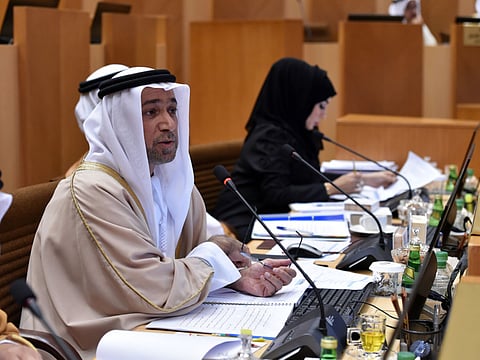Sleeping law firm partners should be banned, FNC demands
Member calls for standardised licensing services for law firms and lawyers

Abu Dhabi: Members of the Federal National Council (FNC) on Wednesday demanded a ban on Emirati lawyers hiring out trade licences of law firms without actually being involved in the practice.
Hamad Ahmad Al Rahoumi, a FNC member from Dubai, called for stamping out the unscrupulous trend of fake Emiratisation in law firms that adversely affect the national economy and for anyone found offering a cover-up to a foreigner to run a law firm illegally being held accountable for the offence.
Members of the House argued a law should be enacted to rectify a widespread business trend in the UAE, whereby Emirati lawyers tie-up with foreign business partners and then obtain licenses to legalise their businesses.
But rather than staying fully engaged in running the business, the Emirati partner plays the role of a ‘sleeping partner’.
The role of the Emirati partner in this case ceases soon as the licence is obtained, while the foreigner takes absolute charge of the legal firm in terms of operation and management.
The members said when such an unscrupulous law firm goes bankrupt, the foreigner runs away from the country, leaving the ‘sleeping partner’ to face the music with loads of financial obligations owned to local or foreign banks in the country.
Members of the House also pressed for creating more jobs for Emirati lawyers.
Shaikh Mohammad Al Nuaimi, a member from Ajman, told the House that 56 per cent of Emirati lawyers are not practicing the legal profession.
“Only 44 per cent of Emirati lawyers are practicing the profession, while the majority of lawyers should be absorbed in private sector as legal consultants.
Al Nuaimi, also head of the Constitutional and Legislative Committee, argued Emirati lawyers cannot have additional business permits in any economic department except law services, thus limiting their source of income to the legal profession.
“Non-practicing Emirati lawyers can always be absorbed into the profession if conditions become conducive and when the Ministry of Justice and the Ministry of Human Resources and Emiratisation further boost cooperation efforts to create more jobs for them,” Al Nuaimi said.
FNC member Mohammad Abdullah Al Mehrezi demanded that a one-stop shop be developed to offer standardised licensing services for law firms and lawyers.
Members of the House also called for firm supervision of the Ministry of Justice over law firms operating in the Free Zones across the country.
They demanded that health insurance be provided to Emirati lawyers.
Marwan Bin Ghalita, First Deputy Speaker of the House, called for making specialised workshops and training programmes obligatory for lawyers.
Saeed Abdullah Al Motawa, a member from Sharjah, demanded creating a lawyer rating system, which evaluates lawyers and law firms in the UAE, based on overall performance and peer review.
He suggested the rating system be based on the confidential information on the overall performance and opinions of members of the Bar and the Judiciary.
“The Ministry of Justice gather information about performance of lawyers and law firms and confidential questionnaires are sent to lawyers and judges in the same area of practice as the member being rated. All Rating review materials are strictly confidential, to allow participants to provide candid assessments of their colleagues,” he said.
Sultan Bin Saeed Al Badi, Minister of Justice, was positive about most of the suggestions put forward by members of the House, pledging that their ideas will be considered when new rules are issued.
Alimony defaulters deserve second chance, FNC member says
Abu Dhabi
A member of the Federal National Council demanded that people imprisoned over inability to pay alimony in divorce settlements be given a second chance at life.
Salem Ali Al Shehi, a member from Ras Al Khaimah, told the House the Ministry of Justice should find a way to assist prisoners who have been detained over default on alimony.
The move, he said, should aim to provide aid to settle the debt of certain prisoners so they can be released and secure a job to provide for their families.
Al Shehi argued detention is not always the best solution. “Children need a father at home as they rely on him to be a role model or to provide for the family. In cases of alimony, a father who is in prison due to lack of funds cannot provide for his family if he is in jail. He needs a job to earn a salary so he can meet his obligations,” Al Shehi said.
Khalid Bin Zayed Al Falasi, a member from Dubai, put a question to Obaid Humaid Al Tayer, Minister of State for Financial Affairs, about allowing retirees to seek new jobs while still collecting a state pension or end of service gratuity.
The House approved a motion to change the Federal Law no. 7 of the year 1999 on Pensions and Social Security, so that the Insured entitled to the pension may be allowed to earn two pensions or a pension and a salary or an end of service gratuity.
House members have also suggested that UAE nationals who have retired be allowed to seek new jobs while still collecting a state pension, “because this will encourage locals to work in the private sector”.
The FNC has also asked for an end to the anomaly that means pensions for those who retired before 2008 are less generous than for those retired after 2008, for pensions to be linked to the rate of inflation and for changes to women’s eligibility for a pension to be reversed.



